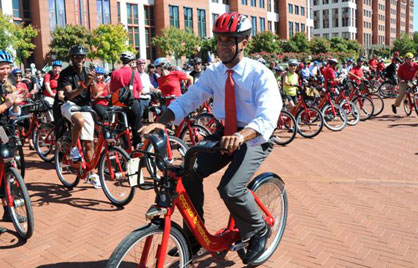Emphasizing Environmental Sacrifice Or a New Vision for Social Progress?

Last night I appeared on a panel here at AU with the editors and contributors to the bold new book “The Environmental Politics of Sacrifice.” The goal of the book is to raise a discussion about the concept of sacrifice which according to the editors “has been curiously unexamined in both activist and academic conversations about environmental politics.”
As several panelists discussed, Americans have achieved a relatively strong environmental sensibility, but by many measures this orientation has yet to translate into meaningful collective action on problems such as climate change. How then can environmental sensibility be turned into the kind of personal and collective sacrifice needed to confront pressing environmental problems?
Perhaps, as the book suggests, one route is to re-claim the concept of “sacrifice,” drawing connections between the need for environmental sacrifice and areas where sacrifice is commonly accepted such as in rearing children, religious devotion, or the risks that police take in protecting communities.
As a newcomer to the discussion, the word and concept strikes me as problematic and perhaps too great of a challenge to shift perceptions and behavior around. As an alternative, at the panel, I proposed that the mission might be defined not in terms of sacrifice but rather as promoting an alternative vision of social progress.
In this case, the focus is not on progress as mastery over nature, but on achieving equilibrium with the environment, within communities, and with others in society. Importantly, this re-focusing of social progress needs to be paired with a new narrative about the “good life” for Americans.
This reclaiming of the notion of social progress also rests on the public perceiving policy solutions as credible and that action will lead to benefits.
One example I emphasized at the panel was the trend today for urban twenty-somethings on the East coast to forego owning cars. Twenty-somethings are not sacrificing car ownership in deference to the environment (despite their concern), but rather because of the perceived co-benefits that happen to coincide with reducing their greenhouse gas emissions.
Recent structural changes in cities such as Washington, DC, including programs such as Zipcar, bike sharing, improved public transportation, better sidewalks, and bike lines, and increased green space, have led young people to recognize the benefits in passing up car ownership, benefits that include exercise, healthier air to breath, lower costs, increased convenience, enhanced personal freedom, and the fun involved in selecting a different Zip car to drive or in taking a bike to work. [See DC Mayor Adrian Fenty test driving a new bike share program in picture above.]
Consider a related example. At the “Think Tank” blog today, John Cookson spotlights the work of University of Wisconsin sociologist Erik Olin Wright who is working to make public transportation free across cities and municipalities. Wright argues that social change rests on communicating about “positive externalities” i.e. co-benefits:
Public transportation systems hold the promise of more efficient movement—and a healthier population—but in many U.S. cities there are few incentives to promote widespread use of buses, subways, trolleys and trains.
A way to realign these incentives and increase public transit use is to make all public transportation free to passengers, Erik Olin Wright, a professor of sociology at the University of Wisconsin at Madison, told Big Think. According to Wright, the benefits of free public transit are broader than are apparent with strict financial bookkeeping. The full value comes in a range of ancillary economic, health and ecological benefits, including:
* “Reduced air pollution, including especially reduced greenhouse gases, which would help mitigate global warming.”
* “More efficient labor markets since it is easier for poor people to get to jobs. This is a benefit to employers for it makes it easier to hire people and it is a benefit to the people without cars who now find it easier to get jobs. But it is also a benefit to the society at large because it contributes to a long-term reduction in poverty.”
* “Health benefits: reduced asthma and other illnesses linked to automobile generated pollution.”
* “Less congestion on the highways for those who do need to drive.”
These “positive externalities” need to be highlighted to gain public support for free transit, says Wright.
See also:
Reframing Climate Change as a Public Health Issue





